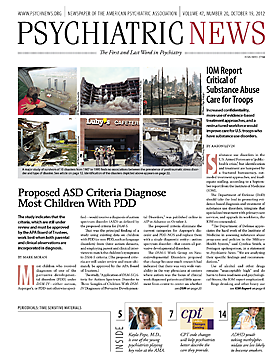Characteristics of a patient’s speaking voice, such as speed, pause, and pitch, may reveal a lot about the severity of depression and can help evaluate the patient’s response to treatment, a new study suggests.
Although psychiatric disorders have largely been accepted by the medical community as diseases with biochemical dysfunction, scientists are still searching for biomarkers—quantitative indicators that can objectively measure the change in severity of these disorders, much like blood pressure or cholesterol concentrations are biomarkers for cardiovascular disease.
In a double-blind, randomized, placebo-controlled study published in the October 1 Biological Psychiatry, several vocal-acoustic characteristics were identified as viable biomarkers to measure the severity of major depression and patients’ response to antidepressant treatment.
“The idea that you can pick up signals of depression in a patient’s voice is at least 50 years old,” James Mundt, Ph.D., the lead author of the study told Psychiatric News. Mundt is a senior research scientist at the Center for Psychological Research, Training, and Consultation in Madison, Wis.
Mundt pointed out that clinicians have long known that as depressed patients respond to treatment and get better, they begin to speak faster, “more crisply,” with shorter pauses. The underlying neurological mechanism linking speech pattern and mental disorders is not well understood, he noted.
“The speech function requires very complex motor control in the [central nervous system],” Mundt explained, and the underlying neurological pathways in the brain are affected by certain psychiatric disorders, manifested in altered speech patterns. The ability to speak is closely related to psychomotor function, thinking and concentration, and the speed of information processing, all of which are frequently impaired in psychiatric disorders.
While the content of speech is consciously controlled, characteristics such as speed, pause, and pitch variation in the voice are not. Thus vocal-acoustic data can provide an indirect but objective measurement of neuropsychiatric dysfunction. Mundt hopes that these biomarkers will prove to be more objective than the current tools based on clinicians’ observations and standard questionnaires.
Previously, Mundt and his colleagues had conducted a small study in 35 patients and identified several vocal-acoustic characteristics that were statistically correlated with the severity of depressive symptoms. The study was funded by a small-business innovation research grant from the National Institutes of Health and published in the January 2007 Journal of Neurolinguistics.
The new study had a larger sample size of 105 patients with depression and a randomized, double-blind design. The patients in this study received either sertraline or placebo for four weeks. About 60 percent in the sertraline group and 40 percent in the placebo group were treatment responders, based on clinical evaluation using the Hamilton Depression Rating Scale (HAM-D) and Quick Inventory of Depressive Symptomatology (QIDS).
The study patients were instructed to call into an automated interactive telephone response system at baseline and after one and four weeks of study treatment. During the call, each patient was guided by a computer program to provide several types of speech samples, including reciting the alphabet and counting from 1 to 20, reading a standard passage commonly used to assess speech disorders, and pronounce each vowel for several seconds. These speech samples were digitally recorded and quantitatively analyzed using open-source software.
Several vocal-acoustic characteristics, namely speed, pauses, and pitch, were significantly correlated with the severity of depression, replicating the findings of the previous smaller study. In both studies, researchers found that more severely depressed patients tended to speak slower, take a longer time to complete the same number of words, and display longer pauses between words and sentences.
A decrease in depression symptoms in treatment responders and differences between responders and nonresponders, based on HAM-D scores, were consistently associated with changes and differences in the vocal-acoustic data over time within individual patients.
This study was partially funded by Pfizer, as the pharmaceutical industry is increasingly interested in objectively and quantitatively measuring disease severity and early response to treatment during clinical trials, Mundt explained. Unlike blood tests, the vocal-acoustic characteristics are easy to capture and noninvasive. Researchers do not even need high-quality recording equipment. In both studies, patients called into the automated telephone system using ordinary landline telephones with reasonable sound quality.
The same technology is currently being studied in other neurological disorders such as early Alzheimer’s disease and Huntington’s disease, Mundt told
Psychiatric News, with the potential for it to screen for early symptoms and monitor disease progression.


